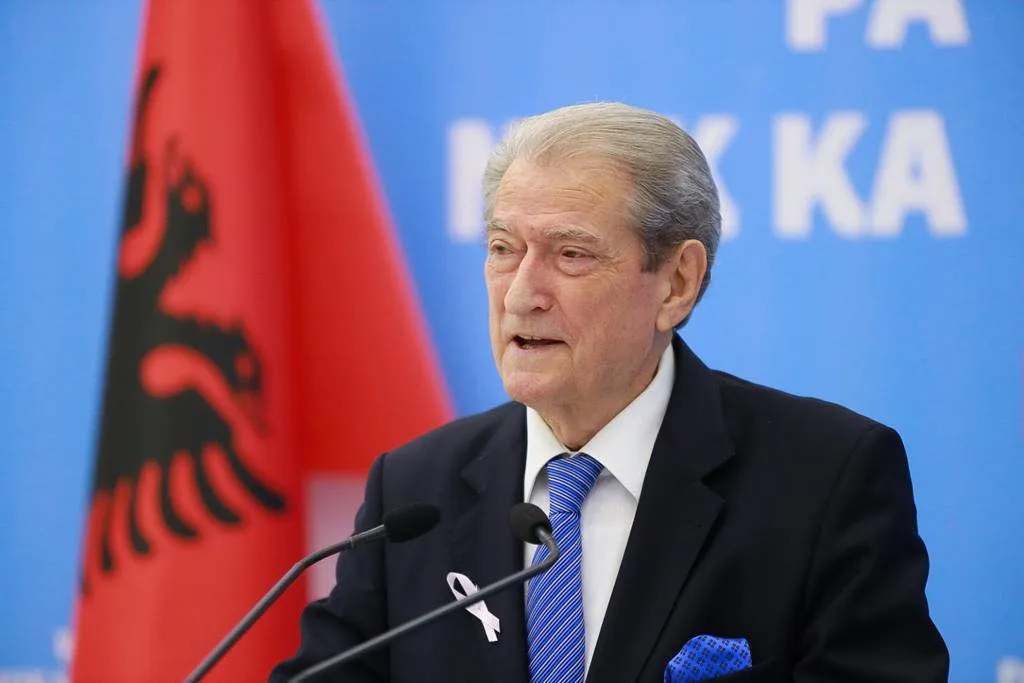Berisha promises to renegotiate maritime agreement with Greece if elected

Democratic Party leader Sali Berisha has vowed that, if he returns to power after the May 11 elections, his government will restart talks with Greece to find the “best possible solution” for the maritime border agreement between the two countries. Berisha’s statement coincided with the publication of Prime Minister Edi Rama’s interview with Greek newspaper Ta Nea, in which Rama discussed key unresolved issues, including the wartime law and the maritime border dispute. Notably, Berisha made these comments while seated next to Fredi Beleri a highly controversial figure in Albania.
Why is this important: Relations with Greece are important to Albania, but they have been quite complicated at time because of a host of unresolved issues. In recent years, the Beleri case has caused a chill in diplomatic ties, and only recently has there been signs of a thaw. Berisha’s remarks and the fact that he was sitting next to Beleri make it unlikely that they will help him electorally. Most Albanians do not seem to have a favorable opinion of Beleri and there is a widespread perception among Albanians that the maritime deal he signed was detrimental to Albania and gave away 300 square miles of sea to Greece. Instead, it appears more probable that Berisha is reaching out to the Greek government in a continued effort to ease his international isolation.
Context: In April 2009, Albania and Greece, under Berisha and then-Greek Prime Minister Kostas Karamanlis, signed a maritime border agreement, which was later annulled by Albania’s Constitutional Court in 2010 as unconstitutional. The case was brought before the court by Edi Rama’s Socialist Party, which at the time was in opposition. The court’s ruling led to a diplomatic rift, with Greece hinting at blocking Albania’s EU accession process.
Despite the tensions, Albania and Greece resumed negotiations in 2015, under Rama’s government, to resolve several longstanding disputes, including the maritime border, property rights, the construction of cemeteries for the Greek soldiers who died in Albanian territory during WWII, and the status of Albanian pensions for former emigrants in Greece. One of the key points of discussion was also Greece’s wartime law against Albania, which Athens never formally repealed, despite declaring its removal in 1987.
After years of diplomatic efforts, in 2020, Albania and Greece agreed to send the maritime dispute to the International Court of Justice (ICJ). However, four years later, no progress has been made, largely due to deteriorating bilateral relations, particularly following the 2023 arrest of Fredi Beleri, an ethnic Greek politician – who was elected mayor of Himarë while in pre-trial detention – for vote-buying. Beleri’s case has been a major source of diplomatic tension, with Greek Prime Minister Kyriakos Mitsotakis personally advocating for his release and threatening to block Albania’s EU integration, while Rama has insisted that the matter is for the justice system to decide.
What did Berisha say: Despite the Constitutional Court’s ruling, Berisha maintains that the 2009 agreement was the best deal Albania could secure and has continued to defend it.
“That agreement was signed when Greece had declared territorial waters of 6 nautical miles. Naturally, Greece had full legal right under international law to extend them to 12 miles, but it did not. Greece agreed to sign the deal while recognizing the 6-mile limit. This was a real advantage for Albania that will never be achieved again.”
Berisha also claimed that the Constitutional Court’s decision to annul the deal was politically influenced by Rama, adding that his government at the time had already agreed with Greece to submit the case to the ICJ.


